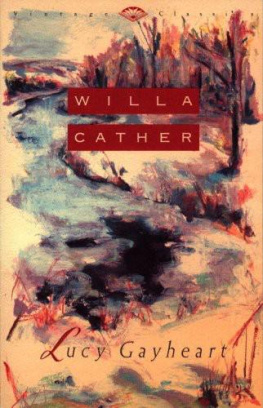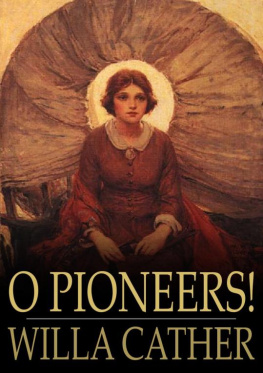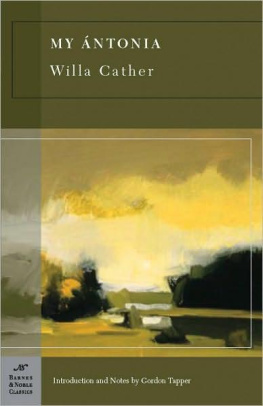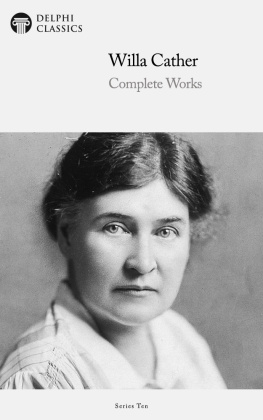Foreword by
KATHLEEN NORRIS
A MARINER BOOK
Houghton Mifflin Company
BOSTON NEW YORK
Copyright 1918 by Willa Sibert Cather;
copyright renewed 1946 by Willa Sibert Cather;
copyright 1926 by Willa Sibert Cather;
copyright renewed 1954 by Edith Lewis.
Foreword copyright 1995 by Kathleen Norris.
ALL RIGHTS RESERVED
For information about permission to reproduce selections from
this book, write to Permissions, Houghton Mifflin Company,
215 Park Avenue South, New York, New York 10003.
Library of Congress Cataloging-in-Publicaton Data
Cather, Willa, 18731947.
My ntonia/Willa Cather ; foreword by Kathleen Norris.
p. cm.
ISBN 0-395-75514-x (pbk.)
ISBN 978-0-395-75514-3 (pbk)
1. Farmers' spousesNebraskaFiction. 2. Married women
NebraskaFiction. 3. Farm lifeNebraskaFiction. I. Title.
PS 3505. A 87 M 8 1995
813'.52dc20 95-30223 CIP
Book design by Anne Chalmers
Type is Janson (Adobe PostScript TM )
Printed in the United States of America
DOC 30 29 28 27 26 25 24 23
The introduction to this book was revised by the author in 1926.
The original 1918 introduction is reprinted in this edition as an appendix.
CONTENTS
Foreword by Kathleen Norris
Introduction
BOOK I
The Shimerdas
BOOK II
The Hired Girls
BOOK III
Lena Lingard
BOOK IV
The Pioneer Woman's Story
BOOK V
Cuzak's Boys
APPENDIX
Willa Cather's Original Introduction
to the 1918 Edition
FOREWORD
BY KATHLEEN NORRIS
In the mid-1970s, not long after I had moved from New York City to Lemmon, South Dakota, I attended a ninetieth birthday party for a woman who had been one of the original homesteaders in the area, having immigrated from Sweden with her parents in 1909. The Lutheran church basement was decorated with crepe paper streamers, and one table held family photographscolor snapshots of the great-grandchildren, wedding photographs from the 1950s, daguerreotypes of stern-faced ancestors in the Old Country. Most of the woman's children were in attendance; I knew the ones who ranched in the area, but not those who had moved on to Oregon, Washington, California. In the course of our conversation, my husband asked her how many children she'd had, and the woman laughed nervously and said, "Oh, dear, I don't remember. Some died so young. Sixteen, maybe ... fourteen. Eleven lived."
Such stories seem anachronistic in present-day America, but the monumental rigors of pioneer life are still a vivid memory for many on the Plains. Willa Cather's My ntonia is about the hardy people who risked their lives and fortunes in a harsh new land; Cather had the great good fortune to have lived among the first generation of white settlers in 1880s Nebraska, and she gives witness to their time and place in such a way that American literature will never forget them. My ntonia, following O Pioneers! (1913) and The Song of the Lark (1915), completes the trilogy of Cather's best-known Nebraska novels. Critic H. L. Mencken thought My ntonia to be the most accomplished and, reviewing it in 1919, shortly after it was published, he wrote, "Her style has lost self-consciousness; her feeling for form has become instinctive. And she has got such a grip upon her materials ... I know of no novel that makes the remote folk of the Western prairies more real ... and I know of none that makes them seem better worth knowing."
It was risky, in the early part of this century, to presume to write fiction about ordinary, rough-hewn people engaged in the rigors of dry land fanning in frontier Nebraska. The prevailing literary style was for overrefined, predictable, plot-driven novels with characters who held fast to European pretensions and standards of gentility. Along with writers such as Theodore Dreiser and Sinclair Lewis, Willa Cather was seen by some contemporary critics as an answered prayer. Writing about O Pioneers!, which had established Cather's national reputation when it appeared in 1913, one critic stated, "Here at last is an American novel, redolent of the Western prairies."
Louise Bogan, who termed Cather an American classic in The New Yorker, treasured the authority of Cather's voice, her having "learned all there was to know about the prairie, including how to kill rattlesnakes and how prairie dogs built their towns." Above all, Bogan praised Cather for not being one of those "writers of fiction who compromised with their talents and their material in order to amuse or soothe an American business culture." Refreshed by Cather's evocation of pioneer life, Bogan said admiringly that Cather "used her powers ... in practicing fiction as one of the fine arts."
Cather herself complained in a 1922 essay that "the novel, for a long while, has been over-furnished." Intent on telling the truths of a particular time and place, she made her own prose as spare as the land about which she was writing, and became a pioneer in American fiction. While Europe figures in My ntonia as a lost Eden, or a repository of terrible secrets that haunts the immigrants in their new land, the novel is solidly grounded in America, its language the uncluttered idiom of the farmers and townspeople of Webster County, Nebraska. For example, young rural women in Boston or New York who moved into town to earn wages to help support their families on the farms were commonly called "servants." Cather, however, knew that in Nebraska they were called "hired girls," and that's what she calls them in My ntonia.
Cather's Nebraska novels vibrate not only with the spoken language of ordinary people, but with the visual images that help a reader truly to see a place. In My ntonia Cather moves smoothly and spectacularly from the small detail to an exalted vision of the landscape and its possibilities. Not long after ten-year-old Jim Burden arrives in Nebraska, having been orphaned in Virginia, he mulls over his grandmother's solemn instruction never to go to the garden without a stick for clubbing rattlesnakes. Then he muses: "Alone, I should never have found the garden.... I wanted to walk straight on through the red grass and over the edge of the world, which could not be very far away ... if one went a little farther there would be only sun and sky, and one would float off into them, like the tawny hawks which sailed over our heads making slow shadows on the grass."
Willa Cather was born on December 7, 1873, near the town of Winchester, Virginia, in the North Neck region of the state, where her ancestors had farmed since the late eighteenth century. She was the first of seven children. Cather was nine when her family moved to Nebraska, following her father's parents and his brother, who had emigrated to the frontier during the 1870s. Cather's family left behind a large and prosperous farm, a house that Cather remembered as roomy and cheerful, and, of course, the lush foliage of Virginia. Her family settled on a farm near Red Cloud, Nebraska, which had been founded in 1870, and by the time Willa Cather arrived, it had a population of about 1,000 a school, and a small opera house.
The near-treeless countryside could not have been less like Virginia, and the drastic change took a toll on the young Willa Cather. In a newspaper interview following the publication of O Pioneers! Cather said that the new landscape had evoked a sense of "erasure of personality." In My ntonia, Jim Burden says of his first glimpse of Nebraska, "There was nothing but land: not a country at all, but the material out of which countries are made." During the twenty-mile trip by horse-drawn wagon from town to his grandparents' farm, Jim looks out at the starry night and says of his deceased parents, "I had left even their spirits behind me. The wagon jolted on, carrying me I knew not whither.... Between that earth and sky I felt erased, blotted out."
Next page







